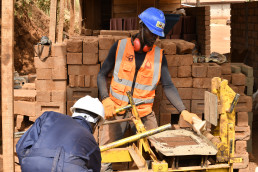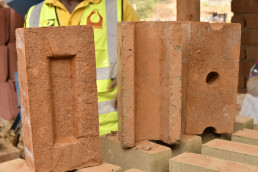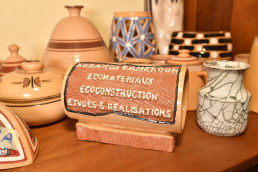A Balancing Act: Growth and Sustainability
Yaoundé, the vibrant capital of Cameroon, is abuzz with construction activity, cranes dot the skyline, and the constant hum of construction fills the air. As the city grows, it is trying to keep up with the housing and infrastructure needs of its increasing population. Millions of homes are needed to house its people. A projected average annual growth of 6.2% in the construction sector to build housing and infrastructure will put a strain on the environment.
Conventional building materials used in the construction industry in Cameroon, which include concrete and fired clay bricks have a toll on the environment. Concrete is made from cement – an expensive raw material and a source of high carbon emissions. Moreover, buildings made from concrete do not have adequate insulation and constant cooling of the buildings consumes a lot of energy. Fired bricks also negatively impact the environment as they are manufactured using archaic methods and rudimentary tools, using a substantial amount of firewood and energy. To address this challenge, a young engineer in Yaoundé, Eric Andela, is contributing to a shift in the industry.
Eric Andela established Keramos in 2016 with a team of like-minded people. Initially, the company focused on pottery and ceramics, but faced challenges in establishing itself. However, inspired by Cameroon’s traditional building methods that used abundant local resources like clay and lateritic soils, Eric saw an opportunity to contribute to literally building a sustainable future for his country.
The pivotal moment for Keramos came in November 2020 when Eric participated in a training program in Dschang. This training, conducted by ACP-EU Development Minerals Programme in collaboration with the University of Dschang, aimed to promote eco-construction practices. The programme launched a call for applications to select artisanal and small-scale mining enterprises (ASMEs) for this training, and the Keramos team met the criteria, demonstrating a strong business plan and outlining his equipment requirements. This marked a turning point, leading Keramos to expand its activities into the production and promotion of eco-friendly building materials, with the aim to revolutionize the construction industry in every region of Cameroon.
The Programme, implemented by UNDP, recognized the potential of Keramos and provided crucial support through entrepreneurship training, equipment for a storage warehouse, a brick press, and other essential tools. This partnership was a catalyst enabling Keramos to expand its product range, which now includes tiles, refractory bricks, and decorative ceramics.
From Tradition to Transformation

KERAMOS now specializes in manufacturing low-carbon stabilized earth bricks made from locally available clay and lateritic soils. Composed of only 8% cement, they offer a low-carbon alternative to conventional building materials. These eco-friendly materials significantly reduce the environmental impact of construction by using Cameroon’s natural resources and reducing the reliance on cement.
The benefits of stabilized earth bricks extend far beyond their eco-friendly properties. Earth bricks provide improved acoustics through superior sound insulation for quieter, more comfortable spaces, while excellent thermal insulation reduces energy consumption for heating and cooling.

Building the Foundation: A Partnership for Progress
Since the training in 2020, Keramos’s production and turnover have seen exponential growth. They have expanded their team to 11 permanent staff (including 5 women) and over 180 part-time workers across three regions of Cameroon: South, Littoral, and East regions. The company is now targeting a production capacity of 150,000 bricks per 3-month contract, primarily supplying municipalities with materials for projects like health centers and classrooms. Starting with 1-2 contracts per year, they are now handling 5-6 contracts annually.
As they expand and grow, the team at Keramos is also facing some challenges. They need new equipment and storage facilities to expand their production, and reliable logistics and transportation for their operations. They are also looking for finance and investments to grow their business. The team is committed to overcoming these challenges to achieve their goals.

Laying the Groundwork: Facing the Challenges, Embracing the Future
“Being part of ACP-EU Development Minerals Programme and UNDP has boosted our company’s activities in a number of ways,” says Eric Andela, CEO of Keramos. “We have gained in image, credibility and leadership. We have acquired sophisticated tools for better management and communication within our company and our project. We have integrated networks of professionals in the sector, both nationally and internationally. In one word, we have become credible in the eyes of the general public.”
This credibility has opened doors, forging new partnerships with artisans, engineers, and local businesses. The company is now supplying eco-friendly bricks for variety of construction projects, from residential homes to commercial buildings, thus supporting the creation of jobs and contributing to the economic development of Cameroon. It is also using modern digital tools like e-commerce platforms for sales and inventory management.
By using local resources, creating jobs and promoting sustainable construction practices, Keramos is laying the foundation for a greener, more resilient Cameroon. Team Keramos is building more than just bricks; they are building a sustainable future.
